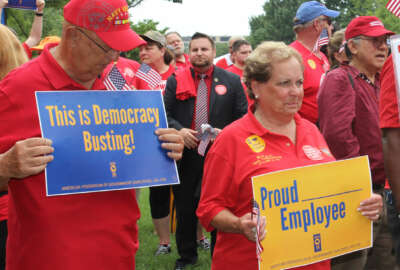

A federal judge invalidated nine provisions of the President’s workforce executive orders in a ruling last August. But the U.S. Court of Appeals overturned th...
Best listening experience is on Chrome, Firefox or Safari. Subscribe to Federal Drive’s daily audio interviews on Apple Podcasts or PodcastOne.
The U.S. Court of Appeals on Tuesday granted the Trump administration a win in its efforts to implement and enforce the president’s limits on collective bargaining and official time for federal employees.
The appeals court overturned an August 2018 decision from a federal district court, which had invalidated nine key provisions of the president’s three executive orders. A group of federal employee unions had challenged the workforce executive orders last summer in the U.S. District Court for the District of Columbia.
But the federal district court ultimately lacked jurisdiction in deciding the unions’ claims, the appeals court said Tuesday.
“We reverse because the district court lacked subject matter jurisdiction,” said Judge Thomas Griffith, who wrote the opinion on behalf of a three-judge panel on the U.S. Court of Appeals for the D.C. Circuit. “The unions must parse their claims through the scheme established by the [Federal Service Labor-Management Relations] Statute, which provides for administrative review by the [Federal Labor Relations Authority] followed by judicial review in the court of appeals.”

But the federal employee unions that sued the Trump administration over the president’s workforce executive orders have argued the FLRA doesn’t give them an opportunity to challenge the EOs as a whole.
The appeals court, however, disagreed.
“The unions’ challenge in this case of the type that is regularly adjudicated through the Federal Service Labor Management Relations Statute’s scheme: Disputes over whether the statute has been violated,” Griffith’s opinion reads. “And the unions ask the district court for the same relief that they could ultimately obtain through the statutory scheme, namely rulings on whether the executive orders are lawful and directives prohibiting agencies from following the executive orders during bargaining disputes.”
Government attorneys and federal employee unions have been arguing over these executive orders in court for nearly a year. Both the American Federation of Government Employees and the National Treasury Employees Union have vowed to continue.
“This fight is not over,” NTEU National President Tony Reardon said Tuesday in a statement. “Not only will NTEU pursue every legal avenue to block these destructive executive fiats, but we will build on the progress we have made alerting Congress and the public about how the administration continues to attack and disrespect its own workforce.”
AFGE also said it would use “every legal tool available” to fight the appeals court’s decision.
Randy Erwin, president of the National Federation of Federal Employees, said NFFE and the other plaintiff unions would meet to evaluate their legal options.
The International Federation of Professional and Technical Engineers similarly said it wouldn’t be surprised if the case was “tied up in a legal morass for a significant period of time.”
“It’s important to understand that the Court of Appeals did not rule on the merits of the case, merely on the issue of jurisdiction,” Erwin told reporters Tuesday. “The Trump administration didn’t get a stamp of approval here.”
After exercising jurisdiction over the unions’ legal challenge, Judge Ketanji Brown did not declare the executive orders themselves as violations of the law in her August opinion. The president did not overstep his executive authority or constitutional power by issuing these executive orders on federal labor-management relations, she said.
But, she said nine of the provisions outlined in Trump’s three executive orders conflict with the original intention Congress had in drafting and passing the Civil Service Reform Act and Federal Labor-Management Relations Statute back in 1978. The provisions included:
The Office of Personnel Management told agencies shortly after the district court’s ruling last August to comply with the judge’s ruling.
Employee unions, however, have said they’re still seeing the impacts of the workforce executive orders.
Both AFGE and NTEU have said various agencies have made proposals in recent collective bargaining negotiations that largely mirror portions of the president’s workforce executive orders. The Department of Veterans Affairs has limited official time for some 104,000 medical professionals within the agency, and it’s currently pursuing additional limits in its bargaining negotiations with AFGE.
The Department of Health and Human Services, after the Federal Service Impasses Panel largely ruled in its favor, can begin to charge NTEU rent for the use of office space or other supplies.
Other agencies, including the Education Department, Environmental Protection Agency and Social Security Administration, either are pursuing or have already imposed new policies that reflect the executive orders and their ideas.
“While we consider our legal options and next steps, we also call on members of Congress to stand with federal workers and protect our workplace rights,” AFGE National President J. David Cox said in a statement. “The union-busting framework laid out in the executive orders and the actions already taken at the bargaining table so far demonstrate clearly that there must be a check on the president’s power to destroy federal employees’ union rights.”
Tuesday’s decision was also met with criticism by some Senate Democrats.
“It’s a naive decision by the courts,” Sen. Ben Cardin (D-Md.) told reporters. “These impasse panels are anything but objective. It really does affect the rights adversely affect the rights of our federal workers. We’re going to look in Congress and see if we can’t take steps in the appropriations process, or by law, [with] a statute to try to protect our federal workforce and the rights of collective bargaining. We hope we would have Republicans join us.”
Copyright © 2024 Federal News Network. All rights reserved. This website is not intended for users located within the European Economic Area.
Nicole Ogrysko is a reporter for Federal News Network focusing on the federal workforce and federal pay and benefits.
Follow @nogryskoWFED
